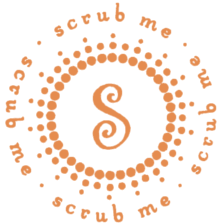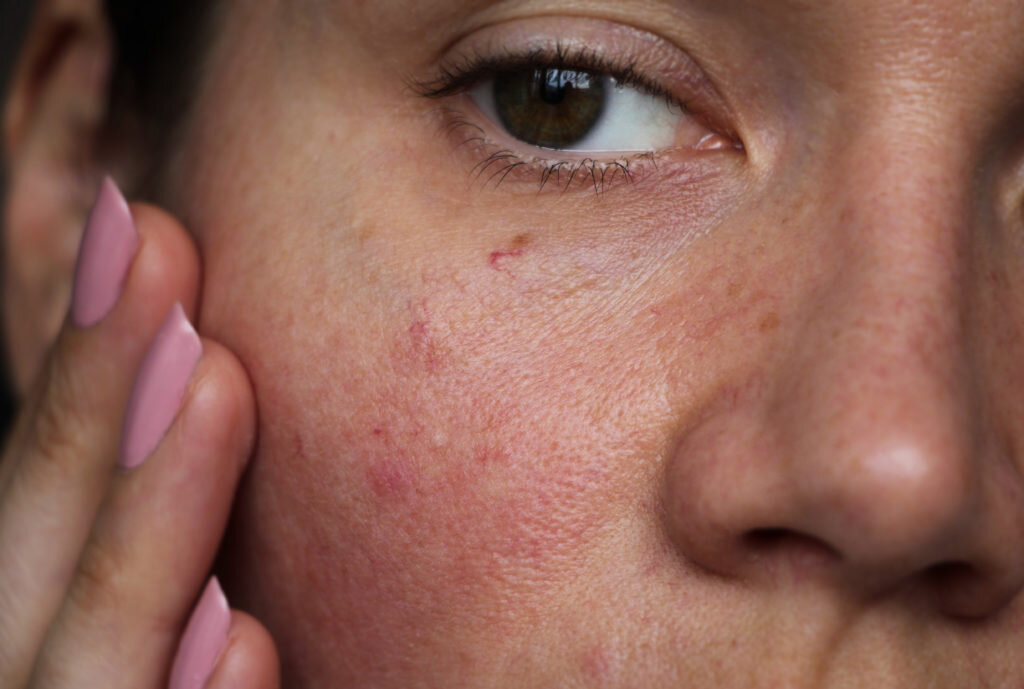Treat & reset your sensitized skin.
Sensitized skin is different from sensitive skin. Sensitive skin is a genetic skin type that has a barrier that is easily compromised or thrown off balance and is prone to inflammation. Sensitive skin types are born with this type of skin that gets red, itchy or damaged easily. Sensitized skin is a skin condition that results in red, itchy, bumpy, or irritated skin; this is usually caused by skincare products, facial treatment, or lifestyle. As an esthetician, I see more sensitized skin vs. sensitive skin. You can usually tell if your skin is sensitized vs. sensitive if your redness, uneven texture, or itchiness is a newer occurrence (within the last year) after a skincare or lifestyle change. Sensitized skin can be returned back to a normal/balanced state, in turn alleviating your redness, bumps, and itchiness.
scrub me secret: When the skin’s barrier (the acid mantle) is off balance and not functioning correctly skincare products cannot work the way they should. Sensitized skin will not react to products properly because the acid mantle is not healthy.
Reasons for sensitized skin:
Irritating products:
Some skincare products contain ingredients that cause irritation. Artificial fragrance, alcohols, lanolin, and some emulsifiers and preservatives are common skin irritating ingredients. On your ingredient label, you should look for things like fragrance or perfume, lanolin, propylene glycol, MCI, ethanol, isopropyl alcohol, and denatured alcohol; these are not ALL of the skin-irritating ingredients out there but they are some of the common ones. When experiencing sensitized skin check your product labels and make sure there aren’t any ingredients that will disturb your skin. I like the ThinkDirty app where you can type in your skincare product and it will tell you how safe it is.
scrub me secret: while alcohol like isopropyl, denatured, and ethanol is something that we do not want to see on our skincare product label, fatty alcohols like Cetearyl alcohol and cetyl alcohol are helpful for retaining moisture and not known to be irritating.
Using the wrong products:
Using a cleanser that is too harsh for your skin type or using acne products when your skin doesn’t necessarily need them is also a way that you can sensitize your skin. A common mistake is using acne products on your entire face when you are experiencing minor breakouts. A better solution is to keep your products tailored to your normal skin type and use an acne spot treatment or mask spot treatment for breakouts. Using a cleanser with salicylic, benzoyl peroxide, or glycolic acid can also be too harsh for some skin types. Also, using a non-facial cleanser like bar body soap or body wash is something that can greatly sensitize the skin.
scrub me secret: clay masks can be sensitizing for skin types that don’t produce that much oil. If your skin type is dry, or normal/dry I suggest only using a clay mask as a spot treatment or a T-zone mask. Using a clay mask on your entire face is best for oily skin types.
Too much exfoliation:
Exfoliation is part of a great skincare routine but too much exfoliation can lead to sensitized skin. Chemical exfoliants like retinol, glycolic acid, lactic acid, and enzymes are helpful for softening skin and tightening pores but if overused can cause irritation. Exfoliating with too harsh of pressure with a physical scrub or using a scrub with rough particles can also cause redness, bumps, and uneven texture. If your skin has small breakouts, a bumpy texture, or excessive flaking do not exfoliate to try to treat this as it could make the problem worse. Instead treat the skin with refreshing toners, healing masks, and nourishing lotion or oil.
scrub me secret: switching up your products often or adding a lot of new items all the time can cause some confusion in your skincare routine that could lead to an unhealthy barrier and sensitized skin. When adding a chemical or physical exfoliant it’s best to start with adding one of these products, see how your skin likes it, and use it for a couple of weeks before adding something new.
How to fix sensitized skin:
Clean up/simplify your skincare:
First, take a look at all your skincare in your routine and make sure you don’t see any of those common skin-irritating ingredients. Switch up any skincare that seems unsafe or unhealthy for your skin. Your esthetician or the “ThinkDirty” app can help with this if you are unsure. Then, take a review of all your products and make sure you know exactly why you are using each and every item and what it’s doing to improve your skin, if you have too many random items in your routine your barrier might be unbalanced or not functioning correctly. While your skin is sensitized take any clay or decongesting masks and lighten up how much exfoliation is going on. If you’re using a physical scrub, gently scrub once a week while trying to remedy your sensitization. If you use a heavily astringent toner, replace it with something more hydrating If you have a chemical exfoliant like glycolic, retinol, or an AHA cut down the amount you’re using it by half. For example, if you were using your chemical exfoliant 4x a week take it down to 2. You’ll follow this more gentle routine until skin resumes back to a normal state.
scrub me secret: Dealing with sensitized skin can be tricky and sometimes frustrating to try and rebalance and get into healthy condition. Taking a week or 10 days and treating your skin with minimal and gentle products really helps get your barrier back to the place it needs to be. Try using only a mild cleanser, refreshing/hydrating toner, a lightweight soothing lotion, and SPF in the day time. Taking this short period of time to dial back your skincare routine and treat your skin with care will help.
Steer clear of very hot water, facial steam, and hot towels:
Your inflamed, sensitized skin needs all the anti-inflammatory benefits it can get. Showering or washing your face with very hot water to using a hot towel to remove cleansers will trigger more redness and inflammation in the skin. Facial steaming should also be avoided while your skin is in this sensitized state. Using lukewarm or cool water to wash your face and rinse away product is a much better option, this can help relieve some redness or inflamed areas. Rinsing your face with really chilly water at the end of a shower or post-cleansing helps pores tighten and also alleviates redness.
scrub me secret: read the blog post “One of my favorites wellness rituals, hot/cold showers” to see how showering or rinsing with cold water is great for your skin and body!
Commit to a consistent skincare routine:
Having a consistent AM/PM routine where you use the same skincare products daily/weekly is something that will help keep your skin in stable condition. It takes about 28 days for cells to turnover, this means you won’t see any real results from skincare products until after 3-4 weeks of consistent use. Trying a product for a week or a couple of weeks or haphazardly adding new items to your routine won’t give the results you desire and could possibly end up damaging the acid mantle. The one exception to this rule is if you start using a new product and your skin is noticeably irritated or unhealthy within a few days of use then I suggest stopping the use of that specific product. Pick out purposeful products that are correct for your skin type and target your specific skin condition or concerns and stick with a consistent AM/PM routine.
scrub me secret: need help creating a great at-home skincare routine for yourself? check out the blog post “Tips for optimizing your at-home skincare routine” for some inspiration. If you need a bit more guidance schedule a skincare consultation at scrub me skin care studio or contact me via email at scrubandsudsme@gmail.com.
Get a facial or use an at-home soothing mask:
Sensitized skin is in need of balancing, nourishment, and light hydration. You can schedule a facial with your esthetician for sensitive skin where the main focus would be taking down inflammation, restoring the barrier, and hydration. A facial like this will usually not include steam, extractions, hot towels, or decongestants. You can also try an at-home soothing mask to treat your sensitized skin. I like First Aid beauty Oatmeal Face Mask or the PCA Oat Hydrating mask. I also have a great recipe for a safe for all skin types at home DIY mask that has soothing oats and other healing ingredients.
scrub me secret: There’s a blog post coming next week with a DIY recipe for a soothing/hydrating mask that is great for all skin types! This is a great treat for both sensitive and sensitized skin.
These are my personal recommendations as an esthetician. Consult your doctor or dermatologist if you feel your skin sensitivity needs medical attention.


